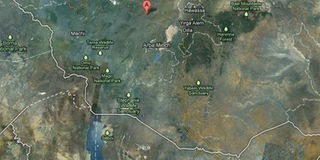Unesco rejects danger listing for Lake Turkana

Lobby group says the construction of Gibe 3 Dam in Ethiopia will increase salinity, affect fisheries, and push Kenya's Lake Turkana's vulnerable ecosystem to the brink of collapse. Photo/GOOGLEMAP
A United Nations agency seeking to safeguard the world's cultural and natural heritage has rejected its advisors' call to include Lake Turkana on a list of endangered sites.
The decision is a blow to Kenyan activists who have been fighting construction of a dam planned for a river in Ethiopia that feeds Lake Turkana.
Ikal Angelei, a leader of the campaign to block the Gibe 3 dam, was honoured at the White House in April after receiving a $150,000 (Sh12.8m) prize from a US philanthropic group.
An official of the NGO that advises Unesco's World Heritage Committee expressed disappointment over Lake Turkana's exclusion from the danger category.
Tim Badman, a heritage specialist with the International Union for the Conservation of Nature (IUCN), said such a listing would have served as “a way of drawing attention and providing support to the sites that need it most.”
The IUCN warns that the Gibe 3 dam, envisioned as the largest hydroelectric project in Africa, will sharply reduce the water level in the most saline of Africa's lakes.
Fish and wildlife stocks will decline as a result, with nearby towns and villages suffering economic damage, the group predicts.
“Flagship species such as the reticulated giraffe and Grevy’s zebra seem to have disappeared” from the area already, the IUCN adds.
In its designation of Lake Turkana as one of 953 sites worldwide with “outstanding universal value,” Unesco says the three National Parks in the area support migratory waterfowl and are key breeding grounds for the Nile crocodile.
The nearby Koobi Fora deposits “have contributed more to the understanding of paleo-environments than any other site on the continent,” Unesco's listing adds.
The World Heritage Committee's decision to exclude Lake Turkana and three other recommended sites from its danger list was made during the committee's meeting in St Petersburg, Russia, which runs until July 6.




